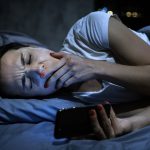Night owls can experience devastating health consequences, but here are 4 solutions
 (NaturalHealth365) There’s a saying that “every hour of sleep before midnight is worth two after midnight.” Is this just folklore, or is it a valuable clue that can help you sleep better?
(NaturalHealth365) There’s a saying that “every hour of sleep before midnight is worth two after midnight.” Is this just folklore, or is it a valuable clue that can help you sleep better?
While it might not track exactly in the research, there is evidence to support the claim that the best sleep starts earlier in the night (and that chronically staying up late could harm your health). To make sure you’re getting the most sleep benefits, let’s find out why.
Want to get more restorative sleep? Getting to bed late robs you of the most important phase of your sleep cycle
In an April 2017 interview with TIME Magazine, sleep experts, including Dr. Matt Walker, head of the Sleep and Neuroimaging Lab at the University of California, Berkeley, and author of bestseller Why We Sleep, weighed in why going to bed earlier is generally better than going to bed later.
First, it’s important to understand that there are two main “cycles” of sleep: REM sleep (dream sleep) and non-REM sleep (non-REM can be further subdivided into three stages). Both cycles are important, but it’s generally found that non-REM sleep is deeper and more restorative.
Next, it turns out that non-REM cycles make up the bulk of sleep in the earlier hours of the night (e.g., before midnight), and this holds true no matter what time you go to bed. As the night goes on, the sleep cycle proportion tends to shift toward REM sleep. This means that if you go to bed very late when your sleep cycles are already trending toward lighter REM sleep, your sleep will be less restorative overall, and you’ll feel super groggy and tired the next day.
An analogy would be like hopping on a “sleep train”: the train’s moving regardless, and when you jump on doesn’t dictate where the train is on its schedule. If you jump on too late, you’ll have missed all the important parts of the initial journey.
Given these findings, it’s no wonder research shows sleep benefits tend to lessen for serious night owls. One 2018 study published in Chronobiology International, involving 433,268 participants with a 6.5-year average follow-up, found that people who stay up later have a 10 percent increased risk of early death compared to “morning people” who hit the hay earlier in the evening.
Are you a natural-born night owl? Here are 4 tips to help reset your circadian rhythm
Experts agree that people are genetically wired to be night owls versus larks and that our naturally-preferred bedtime tends to shift throughout different stages of life. Of course, we can’t just blame genetics: many people stay up late due to bad habits like scrolling on social media, being on the computer, watching television, or failing to use good time management strategies so that they’re forced to stay up later and later to get work done.
But according to the National Institute on Aging, forcing yourself to go to bed when you’re not tired (or staying in bed for too long without feeling sleepy) isn’t helpful, because we want our brains and bodies to associate the bedroom with rest. So, what can late-night fans do?
To the extent that we can modify our lifestyle to maximize our health – even if we are natural-born night owls – here are a few strategies you can use to help you take advantage of those pre-midnight hours:
- Start waking up earlier and don’t let yourself nap during the day. This will increase the odds that you’ll start feeling sleepier earlier in the evening. While you’re at it, avoid stimulating late-night activities that promote later and later bedtimes and do more relaxing things in the evening, like reading, writing in a journal, working on a puzzle or some creative drawing.
- Get exposure to sunlight as early as possible in the morning and minimize light exposure at night (especially exposure to light from digital devices). This helps “set” your body’s internal clock.
- Get at least 30 minutes of challenging exercise during the day. Research shows this can reduce insomnia, alleviates stress, improves sleep quality, and helps you fall asleep faster, according to Johns Hopkins Medicine. Just don’t get any vigorous activity in within about one hour of bedtime, since this can do the opposite of inducing sleep.
- Minimize or eliminate your intake of substances, especially caffeine and alcohol. Due to caffeine’s half-life, it will still exert its stimulant effect on your nervous system as long as six hours after you last consume it. And alcohol will disrupt your brain’s natural sleep cycle, particularly by reducing REM sleep.
Bottom line: Don’t ever underestimate the importance of getting a good night’s sleep. Every reputable (integrative) healthcare provider will tell you … the quality of your life depends upon it.
Sources for this article include:
Sciencedaily.com
ScientificAmerican.com
Time.com
NIH.gov
Sleep.org
Sleepfoundation.org
Sleepfoundation.org
CNBC.com
Hopkinsmedicine.org
Harvard.edu
Harvard.edu



